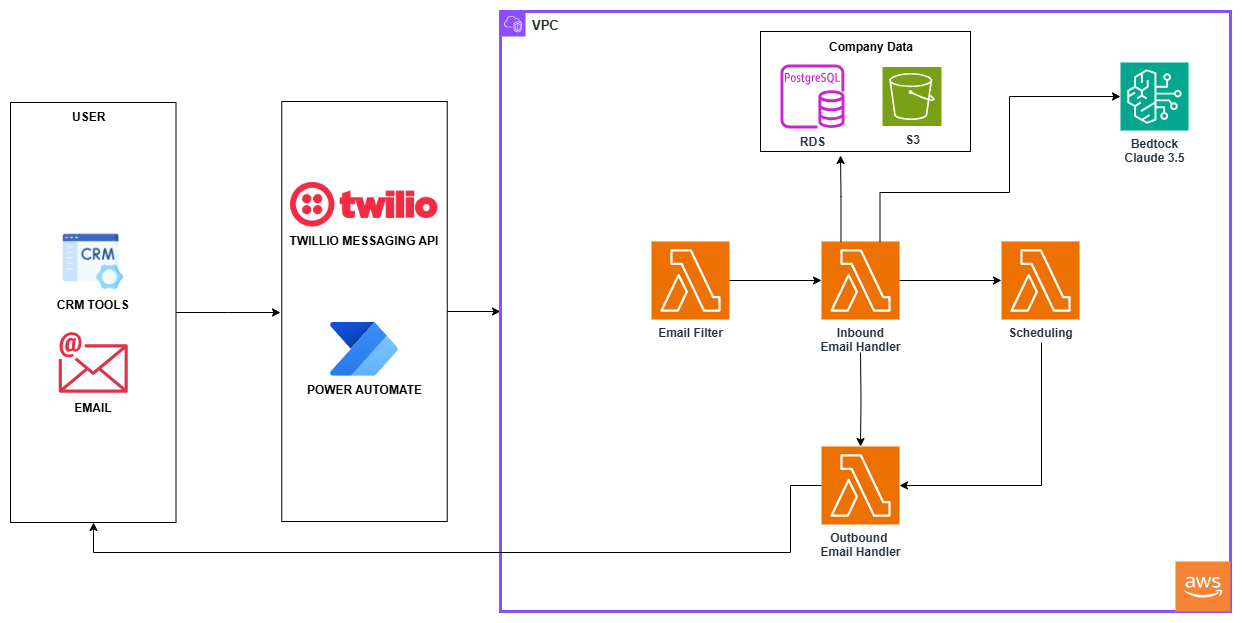Revolutionizing Lead Management for a Real Estate Startup Using AI
Client Overview
Our client, a dynamic real estate startup, operates within competitive urban markets. Specializing in leasing residential and commercial properties, they were eager to provide an enhanced customer experience while streamlining their internal processes. Despite their market potential, they faced challenges in managing incoming leads effectively, often struggling with manual workflows that slowed down operations and reduced conversion rates.
Challenges
The client approached us with the following key pain points:
-
Inefficient Lead Qualification:
-
Assessing incoming leads manually consumed substantial time and effort.
-
Lack of a standardized process led to inconsistent qualification and missed opportunities.
-
-
Cumbersome Appointment Scheduling:
- Scheduling property tours required significant back-and-forth communication, often resulting in delays and scheduling conflicts.
-
Overburdened Agents:
- Real estate agents were overwhelmed with repetitive administrative tasks, leaving them with limited time for strategic customer interactions.
-
Missed Escalation Opportunities:
- Complex or unclear lead scenarios were not adequately addressed, leading to customer dissatisfaction and dropped leads.
Solution Overview
To address these challenges, we designed and implemented a bespoke AI-powered lead management application leveraging Large Language Models (LLMs) and generative AI. This innovative solution incorporated multiple functionalities to automate and optimize the client’s lead management processes.

Key Features:
-
Automated Lead Engagement:
-
The AI engine initiated and maintained personalized email conversations with potential clients.
-
It gathered essential qualification criteria, including:
-
Budget constraints
-
Preferred property type (residential or commercial)
-
Desired location and proximity to amenities
-
Specific features or requirements (e.g., pet-friendly spaces, parking availability).
-
-
-
CRM Integration:
-
The solution seamlessly integrated with the client’s existing CRM system.
-
Real-time updates ensured that lead information was captured, organized, and accessible to the team.
-
-
Appointment Scheduling:
-
Once a lead met qualification criteria, the system automated the process of scheduling property tours.
-
Calendar synchronization minimized the chances of double bookings or missed appointments.
-
-
Human Escalation Mechanism:
-
When the AI faced ambiguous qualification criteria or escalations due to customer queries, it looped in a human agent.
-
Agents were provided with contextual summaries of the AI’s interactions, ensuring seamless continuity in customer engagement.
-
-
Data-Driven Insights:
- The system collected and analyzed engagement metrics to help the client understand lead behavior and refine their marketing strategies.
Implementation Process
The development and deployment of the AI application followed a structured approach:
-
Discovery and Requirement Analysis:
-
Conducted workshops with the client’s team to map their lead management workflows.
-
Identified integration points with their CRM and calendar systems.
-
-
Custom AI Model Training:
-
Trained LLMs on domain-specific datasets, including historical lead interaction logs and industry-specific terminology.
-
Fine-tuned the models to ensure accurate and contextually appropriate responses.
-
-
Application Development:
-
Built a user-friendly interface for the AI engine’s backend management.
-
Developed robust APIs for CRM and email system integration.
-
-
Testing and Optimization:
-
Conducted rigorous testing across multiple scenarios to validate the system’s performance.
-
Iteratively optimized the AI’s response generation and escalation logic.
-
-
Deployment and Training:
-
Deployed the solution in a phased manner, starting with a pilot run.
-
Trained the client’s staff on using and supervising the AI application effectively.
-
Results and Impact
The deployment of the AI-powered lead management application brought measurable improvements:
-
Improved Lead Engagement:
- The AI system engaged with leads promptly, resulting in a 45% increase in lead response rates within three months.
-
Streamlined Scheduling:
-
Automated scheduling reduced appointment coordination time by 70%.
-
Property tours increased by 35%, directly impacting conversion rates.
-
-
Enhanced Agent Productivity:
-
Agents saved approximately 15 hours per week by offloading routine tasks to the AI system.
-
This allowed them to focus on high-value activities, such as closing deals and nurturing client relationships.
-
-
Higher Lead Qualification Accuracy:
- Leads qualified by the AI were 25% more likely to convert compared to manually processed leads.
-
Seamless Human-AI Collaboration:
- Escalated cases were handled efficiently, with agents reporting a 90% satisfaction rate with the system’s context summaries.
Future Prospects
Based on the success of this implementation, the client is exploring additional AI-driven enhancements:
-
Virtual Property Tours:
- Integrating AI-generated virtual tours to provide potential clients with immersive experiences from their homes.
-
Predictive Analytics:
- Leveraging AI to analyze market trends and forecast property demand, enabling proactive marketing strategies.
-
Chatbot Expansion:
- Extending the AI’s capabilities to instant messaging platforms for real-time engagement with prospective leads.
Conclusion
The AI-powered lead management system not only transformed the client’s operational efficiency but also elevated their customer experience. By automating repetitive tasks, ensuring consistent lead qualification, and fostering seamless collaboration between AI and human agents, the solution positioned the startup for scalable growth.
This case exemplifies the transformative potential of generative AI in the real estate sector and serves as a roadmap for other businesses seeking to modernize their lead management processes.











